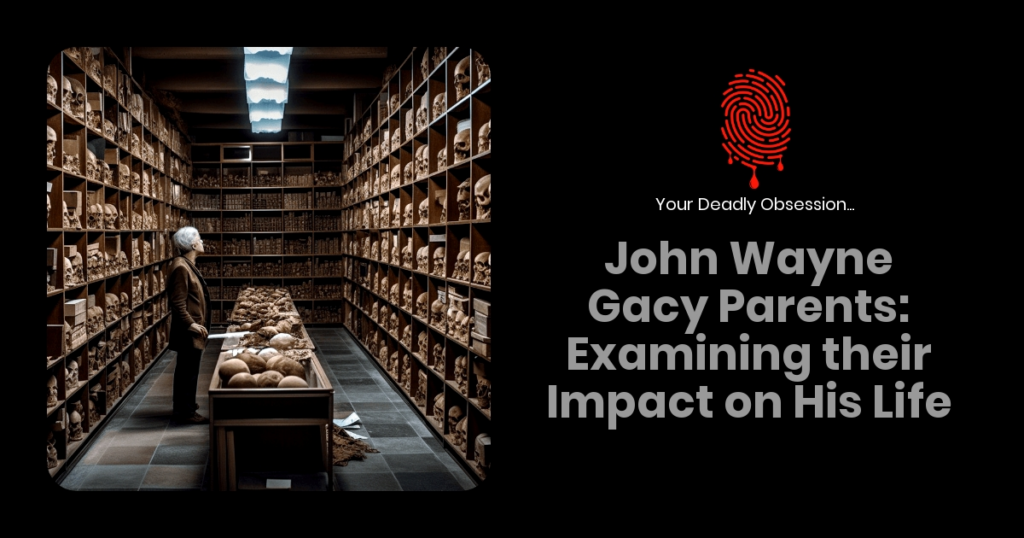Understanding the background and upbringing of notorious serial killer John Wayne Gacy provides valuable insight into the factors that may have contributed to his horrifying actions. His parents, Marion Elaine Robinson and John Stanley Gacy Sr., played a significant role in the development of their son’s personality and behavior. Analyzing the relationship between Gacy and his parents can help us piece together the complex portrait of a man who terrorized the country for years.

Growing up in a turbulent household, John Wayne Gacy experienced consistent physical and psychological abuse from his father. John Stanley Gacy Sr., a World War I veteran and factory worker, struggled with alcoholism and frequently engaged in violent outbursts, targeting both his wife and children. Gacy’s mother, Marion Elaine Robinson, tried her best to shield her children from their father’s wrath, but it often only intensified the abuse. This harrowing environment likely influenced Gacy’s understanding of power, control, and violence.
Despite the abuse, Gacy desperately sought approval and acceptance from his parents. His efforts were often met with disdain or indifference from his father, contributing to a growing sense of inadequacy and resentment. The complex relationship between John Wayne Gacy and his parents offers important context to the man he would become – a chilling reminder that the darkest corners of humanity are sometimes borne from the most innocent of beginnings.
John Wayne Gacy’s Early Life and Family
Born on March 17, 1942, John Wayne Gacy came from a working-class family in the Chicago area. His father, John Stanley Gacy, was an auto repair machinist and World War I veteran, while his mother, Marion Elaine Robinson, stayed at home to care for their three children. In this early life section, we’ll examine Gacy’s upbringing and the role his family played in shaping his future as one of America’s most notorious serial killers.
John Wayne Gacy had a troubled childhood, experiencing both emotional and physical abuse at the hands of his father. His father was known to be an alcohol enthusiast and often disciplined young Gacy harshly, with episodes of both verbal and physical aggression. Growing up, the strained relationship between Gacy and his father was a recurring theme in their family dynamic.
Gacy did not have a lot of success in other aspects of his early life as well. He was overweight, had a heart condition, and suffered from blackouts. As a result, he was unable to participate in many physical activities, further isolating him from his peers. Due to his limitations, Gacy was often the target of bullying at school.
Despite these setbacks, Gacy showed a strong work ethic from a young age. He held various part-time jobs during his teenage years, including working at a grocery store and as a shoe salesman. These work experiences taught him valuable skills that would prove instrumental in the development of his construction business later in life.
Let’s take a look at some key milestones in Gacy’s early life:
- 1942: John Wayne Gacy is born in Chicago, Illinois
- 1954: Gacy is hospitalized and diagnosed with a congenital heart condition
- 1960: Gacy graduates from a business college in Springfield, Illinois
- 1962: Gacy marries his first wife, Marlynn Myers
Throughout Gacy’s early years, his family was a significant influence, both positive and negative. His siblings, siblings-in-law, and mother were supportive of his endeavors, while his relationship with his father remained tumultuous. The critical, abusive environment he faced growing up contributed to the distorted perspectives and motivations that would eventually lead him down a dark path.
Gacy’s troubled upbringing, hardships at school, and complex family dynamics all played a role in shaping the person he would become. Through examining these factors, we can gain a better understanding of how John Wayne Gacy transformed from an ordinary boy to a notorious serial killer.
Conclusion
Honing in on the role of John Wayne Gacy’s parents, we’ve discovered significant aspects that may have contributed to his nefarious deeds. It’s crucial to recognize the influences his upbringing had, as well as consider potential genetic and environmental factors.
We delved into his parent’s background to understand their role in shaping Gacy’s life:
- His father, John Stanley Gacy, was known for showing a rigid and punitive demeanor. The documented physical and emotional abuse imposed by his father is an undeniable factor that might have steered John Wayne Gacy down a tragic path.
- Gacy’s mother, Marion Elaine Gacy, on the other hand, was a consistent figure of support, thereby providing a complex family dynamic that possibly confused the young Gacy.
By examining the family history, we were also able to identify several key factors, including:
- A connection to alcoholism and substance abuse within his immediate family, exemplified by his father’s dependence on alcohol, which adversely impacted the family environment.
- An ongoing struggle with mental health issues, as seen in Gacy’s own diagnosis of antisocial personality disorder, alongside frequent mood swings and blackouts.
Weighing these key points, we can conclude that John Wayne Gacy’s life was profoundly impacted by his tumultuous upbringing, with his parents being significant figures in his development. While this analysis doesn’t excuse his heinous acts or disregard any personal responsibility, it enriches our understanding of how he became the infamous serial killer we know today.
As advocates for delving into the complexities of cold cases, crime, and mysteries, it’s essential for us to examine the role of family, genetics, and environment to have a comprehensive understanding of the perpetrators and the events leading to their actions. By doing so, we hope to contribute to a more informed discourse surrounding these cases and promote empathy for the victims and those left in the wake.

Owner & entrepreneur with a passion for murder mystery! Seriously, who doesn’t love murder mystery?
Chris is a proud member of the American Medical Writer’s Association (AMWA), the International Society for Medical Publication Professionals (ISMPP), the National Association of Science Writers (NASW), the Council of Science Editors, the Author’s Guild, and the Editorial Freelance Association (EFA).

